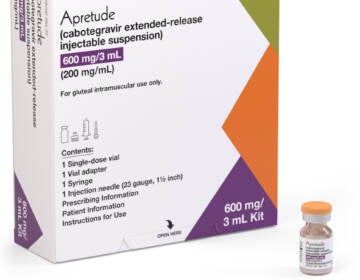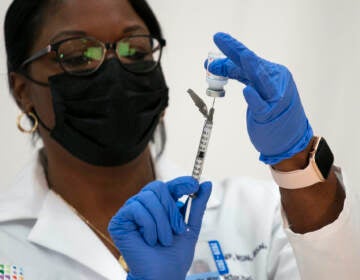COVID vaccine’s mRNA technology also works for an HIV vaccine, study shows
Penn researcher Drew Weissman spent decades developing mRNA technology. He says it helps target the rapidly mutating human immunodeficiency virus.

This 2012 colorized electron microscope image made available by the National Institute of Allergy and Infectious Diseases shows a single human immunodeficiency virus, center, as it was budding from a human immune cell, which the virus had infected, and within which the HIV virus had been replicated. (NIAID via AP)
New research released Tuesday in the journal Cell Reports demonstrates that the mRNA technology used in COVID-19 vaccines can also be used to deliver a successful HIV vaccine.
Among the lead study authors is Dr. Drew Weissman, the Roberts Family Professor in Vaccine Research at the Perelman School of Medicine at the University of Pennsylvania. Weissman spent decades developing the mRNA technology used in COVID-19 vaccines.
It has been difficult for scientists to develop a successful vaccine for HIV because the virus mutates very quickly. The envelope, or protein on the outer surface of the virus that infects cells, is not a rigid structure.
“It’s kind of like a blob of Jell-O,” Weissman said in an interview. He explained that the goal of a vaccine is to create an antibody response that prevents the HIV virus from infecting healthy cells. That’s done by targeting a few specific points on the envelope. But if the envelope is in constant flux, that’s hard to do.
“What we did is we tried to figure out how to stabilize the envelope, how to make that blob of Jell-O into a more rigid structure,” said Weissman. From there, it becomes easier to target the spots that produce the neutralizing antibodies — that is, the antibodies that prevent the virus from infecting healthy cells.
Weissman and his research team were able to find several ways to successfully stabilize the envelope and produce the neutralizing antibodies.
Now, the research can move to the next step: a phase 1 clinical trial led by Duke University, in which the vaccine will likely be tested first in macaques, and then people, to see if it can prevent infection.
This study is a part of a consortium of research universities, pharmaceutical companies, and federal agencies that together are testing a variety of vaccines for HIV. Scripps and Moderna are already testing one vaccine for HIV in a phase 1 trial. Weissman explained that the group anticipates it will need at least three successful vaccines, each of which would target different particular antibodies on the outer envelope of the HIV virus, and each of which would need to go through their own clinical trials.
Once the discrete vaccines have been developed, Weissman said, they will likely be combined and go through a final testing phase. He estimated the process up until that point will take four or five years.
HIV vaccines have been in development for decades, but a long-lasting one has yet to be successful. The mRNA technology offers new opportunities because mRNA produces a more potent antibody response. A recent vaccine trial in Thailand was able to produce neutralizing antibodies against HIV, but it was only about 30% effective and protection wore off after about a year. The idea here is to create something that’s more like 70% effective, said Weissman, and longer lasting.
Weissman has been studying mRNA technology for decades, and he and his team had several trials underway that were delayed by the pandemic. Now, they’re resuming: He’s looking at developing mRNA vaccines for herpes, influenza, a pan-corona virus, and malaria. He said the technology’s success in the COVID-19 vaccines has meant interest in those trials from pharmaceutical companies, funders, and research institutions has skyrocketed.
“I think it has really excited the world,” he said.
According to the Centers for Disease Control and Prevention, more than 1 million people in the United States are living with HIV. Nearly 37,000 new infections were diagnosed in 2019, the last year for which complete data is available, most of them among gay or bisexual men.
In Philadelphia, more than 18,000 people are living with an HIV diagnosis. New cases had been on a steady decline since 2013, though they plateaued in recent years and health officials saw an increase in diagnosis during the first year of the pandemic, when treatment infrastructure was disrupted.
HIV is treatable with antiretroviral pills that must be taken every day. Those who are at high risk of contracting HIV, such as men who have sex with men, can take PrEP, a daily pill used prophylatically to prevent the disease.
A vaccine — which, once tested for efficacy and safety, could be given to young people before they become sexually active — could prevent anyone from contracting HIV in the first place, presenting the opportunity to eventually eradicate the virus.
WHYY is your source for fact-based, in-depth journalism and information. As a nonprofit organization, we rely on financial support from readers like you. Please give today.









